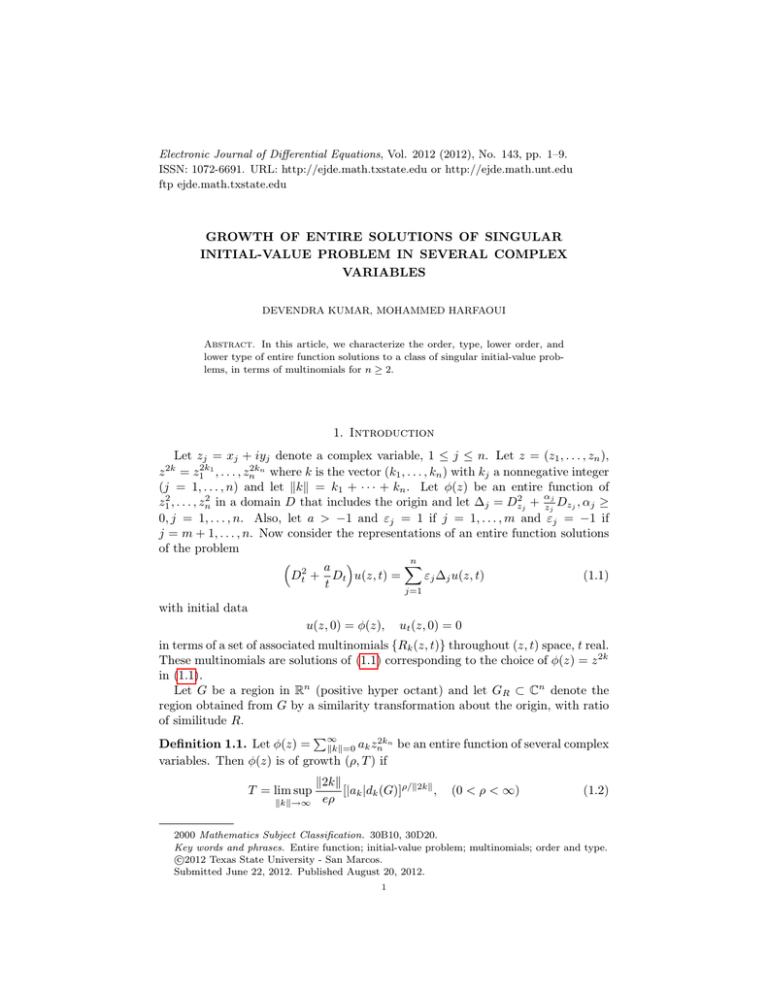Electronic Journal of Differential Equations, Vol. 2012 (2012), No. 143,... ISSN: 1072-6691. URL: or
advertisement

Electronic Journal of Differential Equations, Vol. 2012 (2012), No. 143, pp. 1–9.
ISSN: 1072-6691. URL: http://ejde.math.txstate.edu or http://ejde.math.unt.edu
ftp ejde.math.txstate.edu
GROWTH OF ENTIRE SOLUTIONS OF SINGULAR
INITIAL-VALUE PROBLEM IN SEVERAL COMPLEX
VARIABLES
DEVENDRA KUMAR, MOHAMMED HARFAOUI
Abstract. In this article, we characterize the order, type, lower order, and
lower type of entire function solutions to a class of singular initial-value problems, in terms of multinomials for n ≥ 2.
1. Introduction
Let zj = xj + iyj denote a complex variable, 1 ≤ j ≤ n. Let z = (z1 , . . . , zn ),
z 2k = z12k1 , . . . , zn2kn where k is the vector (k1 , . . . , kn ) with kj a nonnegative integer
(j = 1, . . . , n) and let kkk = k1 + · · · + kn . Let φ(z) be an entire function of
α
z12 , . . . , zn2 in a domain D that includes the origin and let ∆j = Dz2j + zjj Dzj , αj ≥
0, j = 1, . . . , n. Also, let a > −1 and εj = 1 if j = 1, . . . , m and εj = −1 if
j = m + 1, . . . , n. Now consider the representations of an entire function solutions
of the problem
n
X
a εj ∆j u(z, t)
(1.1)
Dt2 + Dt u(z, t) =
t
j=1
with initial data
u(z, 0) = φ(z),
ut (z, 0) = 0
in terms of a set of associated multinomials {Rk (z, t)} throughout (z, t) space, t real.
These multinomials are solutions of (1.1) corresponding to the choice of φ(z) = z 2k
in (1.1).
Let G be a region in Rn (positive hyper octant) and let GR ⊂ Cn denote the
region obtained from G by a similarity transformation about the origin, with ratio
of similitude R.
P∞
Definition 1.1. Let φ(z) = kkk=0 ak zn2kn be an entire function of several complex
variables. Then φ(z) is of growth (ρ, T ) if
T = lim sup
kkk→∞
k2kk
[|ak |dk (G)]ρ/k2kk ,
eρ
(0 < ρ < ∞)
(1.2)
2000 Mathematics Subject Classification. 30B10, 30D20.
Key words and phrases. Entire function; initial-value problem; multinomials; order and type.
c
2012
Texas State University - San Marcos.
Submitted June 22, 2012. Published August 20, 2012.
1
2
D. KUMAR, M. HARFAOUI
EJDE-2012/143
where
R2k = R12k1 , . . . , Rn2kn .
dk (G) = max(R2k );
R∈G
This implies the existence of a positive constant M such that
|φ(z)| ≤ M eT |z
2 ρ
|
∀z ∈ Cn .
Using (1.2), for each ε > 0 there exists a positive integer k0 such that if k ≥ k0 ,
then
eρ(T + ε) k2kk/rho
.
(1.3)
|ak |dk (G) ≤
k2kk
We can easily estimate, from [1, (4.14)], that
k2kk k2kk/rho
Pn
2 ρj
|Rk (z, t)| ≤
M (ρ, T )e−k2kk/ρ eK|t|+ j=1 Tj |zj | ,
(1.4)
ρT
where
Z
M (ρ, T ) =
∞
e−σ+T |σ
2 ρ
|
dσ,
0
and K is the sum of the absolute values of the coefficients of multinomial and
0
0
M (ρ, T ) is a generic constant depending only on the ρj s and Tj s.
Now let
∞
X
u(z, t) =
ak Rk (z, t)
kkk=0
or
|u(z, t)| ≤
N
X
kkk=0
|ak ||Rk (z, t)| +
∞
X
|ak ||Rk (z, t)|.
(1.5)
kkk=N +1
Using the bound (1.5) on |Rk (z, t)| and the estimate on |ak |dk (G) from (1.3), we
see that the bound on second sum in (1.5) is given by
∞
K(ρ, T ) K|t|+Pnj=1 Tj |zj2 |ρj X T + ε k2kk/ρ
e
.
dk (G)
T
kkk=N +1
Since the series of constants in (1.5) converges, it follows that the series u(z, t) =
P
∞
k
kkk=0 ak R (z, t) converges for all n complex variables (z1 , . . . , zn ) and real t and
uniformly so in compact subsets of (z, t) space.
Now we can establish a theorem.
P∞
Theorem 1.2. Let φ(z) = kkk=0 ak z12k1 , . . . , zn2kn be entire in (z12 , . . . , zn2 ) and
2
converge in a domain Gr : z ∈ Cn ; |z|P
= maxi≤j≤n |zj |2 < R2 , R > 0 is a fixed pos∞
itive real. Then the series u(z, t) = kkk=0 ak Rk (z, t) converges for all n-complex
variables (z1 , . . . , zn ) and real t and uniformly so in compact subsets of (z, t) space.
Bragg and Dettman [2] proved the following theorem.
P∞
Theorem 1.3. Let φ(x) = kkk=0 ak x2k be analytic in (x21 , . . . , x2n ) and converge
P∞
in a domain D that includes the origin. Then the series kkk=0 ak Pk (x, t) converges to an analytic solution of the problem (1.1) replacing z by x, at least in
region S where S is defined by (x, t) ∈ S if and only if
1/2
1/2
|x1 | + |t|, . . . , |xm | + |t|, x2m+1 + t2
, . . . , x2n + t2
∈ D.
(1.6)
EJDE-2012/143
GROWTH OF ENTIRE SOLUTIONS
3
We shall proceed to the complex transformation of above Theorem A in the
following manner.
Let (z1 , . . . , zn ) be an element of Cn and R2n , the space of real coordinates.
k
The transformation from real to the complex coordinates are given by xk = zk +z
,
2
zk −z k
n
2n
yk = 2i . We equip C with the Euclidean metric of R ;
ds2 =
n
X
(dx2k + dyk2 ) =
k=1
n
X
dzk .dzk .
k=1
Let zk be a point on the domain GR for which |ak Rk (zk , 0)| = supzk ∈GR |ak Rk
(zk , 0)| = Ck . By a rotation, we can assume that zk2 = (x2k , 0, . . . , 0). If fe(w) =
P∞
f (w2 , 0, . . . , 0)
fe(w) = l=0 al w2l is the Taylor series expansion of fe at the
and
= Ck and therefore we have the following theorem.
origin, then ak x2k
k
P∞
Theorem 1.4. Let φ(z) = kkk=0 ak z 2k be entire in (z12 , . . . , zn2 ) and converge in
P∞
a domain GR that includes the origin. Then the series u(z, t) = kkk+0 ak Rk (z, t)
converges to an entire solution of the problem (1.1) at least in a region S where S
is defined by (z, t) ∈ S if and only if
2
|z1 | + |t|, . . . , |zm + |t|, (zm+1
+ t2 )1/2 , . . . , (zn2 + t2 )1/2 ∈ GR .
P∞
Let φ(z) = kkk=0 ak z 2k be the power series expansion of the function φ(z).
Then the maximum modulus of u(z, t) and φ(z) are defined as in complex function
theory [15, pp. 129, 132],
Mf,G (R) = max |f (z)|,
z∈GR
Mu,S (R) = max |u(z, t)|.
(z,t)∈S
Following the usual definitions of order and type of an entire function of n-complex
variables (z12 , . . . , zn2 ), the order ρ and type T of u(z, t) are defined as in [4]
log log Mu,S (R)
,
(1.7)
log R
R→∞
log Mu,S (R)
T (u) = lim sup
.
(1.8)
Rρ(u)
R→∞
In this paper we characterize the order, lower order, type and lower type of entire function solutions of problem (1.1) in terms of a set {Rk (z, t)} of multinomials
for n ≥ 2. Multinomials of this type have been constructed by Miles and Yong
[12] when z = x and m = n or m = 0. In these cases (1.1) reduces to either the
generalized Euler-Poisson-Darboux or the generalized Beltrami equation. Gilbert
and Howard [5, 6] discussed analyticity properties of solutions of special cases of
(1.1). Bragg and Dettman obtained representation of analytic solutions of problem
(1.1) for z = x in terms of these multinomials for n ≥ 2 [2] and for n = 1 in [3].
It has been found [2] that Rk (x, t), n ≥ 2, can be expressed as a convolution of
n polynomials Rkj (xj , t), j = 1, . . . , n. For n = 1 the corresponding Rk (x, t) are
defined in terms of Jacobi polynomials. The Growth estimates for the solutions
of (1.1) in terms of multinomials Rk (z, t) for n ≥ 2 then permit the obtaining of
global region of convergence from acknowledge of singularities of the given data
function φ(z). It should be noted that the function φ(z) is the analytic continuation of its restriction to the axis of symmetry; i.e., φ(z) = u(z, 0). Using various
ρ(u) = lim sup
4
D. KUMAR, M. HARFAOUI
EJDE-2012/143
techniques, the characterizations of order and type of entire function solutions of
similar problems were obtained by McCoy [13, 14] Kumar [8, 9, 10] and others for
n = 1. However, non of them have considered the case for n ≥ 2.
2. Auxiliary Results
In this section we shall prove some auxiliary results which will be used in the
sequel.
P∞
Lemma 2.1. If u(z, t) = kkk=0 ak Rk (z, t) is an entire function solution of problem (1.1) in terms
of a set {Rk (z, t)} of multinomials corresponding to given data
P∞
function φ(z) = kkk=0 ak z 2k in (1.1) then φ and φ∗ are also entire functions of
n−complex variables (z12 , . . . , zn2 ). Further,
[N (ε)]−1 Mφ,G (R) ≤ Mu,S (ε−1 R) ≤ CMφ∗ ,G (R)
(2.1)
where
φ∗ (z) =
∞
X
n
nY
o
p
|ak |
kj j z12k1 , . . . , zn2kn ,
j=1
kkk=0
iθ
N (ε) = sup{N (εe , ξ) : 0 ≤ θ ≤ 2π, −1 ≤ ξ ≤ 1, 0 < ε < 1}
and C is a constant.
Proof. From Theorem 1.1 and 1.2, bearing in mind with the relation of [2, (3.1)],
we obtain
m
∞
n a + 1 on 2m K n−m n Y
X
Γ(kj + (αj + 1)/2) o
k
|u(z, t)| ≤
|ak | Γ
j
2n
Γ(kj − 1/2)
π m/2
j=1
kkk=0
2kj
× {|zj | + |t|}
q
n
n Y
o
kj j kj !
(zj2 + t2 )kj
Γ((kj ) + (a + 1)/2n)
j=m+1
where qj = max((αj − 1)/2, ((a + 1)/2n) − 1, −1/2), j = m + 1, . . . , n.
Using the relation Γ(x + a)/Γx ∼ xa as x → ∞, we have
Γ(kj + (αj + 1)/2)
∼ (kj − 1/2)(αj +2)/2 ,
Γ(kj − 1/2)
q
kj j kj !
Γkj +
(a+1)
2n
q +1
∼ kj j
(kj )(a+1)/2n
and we see that there exist constants C, p1 , . . . , pn with pj = pj (αj ), j = 1, . . . , m
and pj = pj (αj , a, n) for j = m + 1, . . . , n such that
|u(z, t)| ≤
∞
X
|aj |C
kkk=0
×
2
(zm+1
n
nY
o
p
kj j (|z1 | + |t|)2k1 . . . (|zm | + |t|)2km
j=1
2 km+1
+t )
. . . (zn2
(2.2)
2 kn
+t ) .
P∞
Now, |φ(z)| ≤ kkk=0 |ak ||z1 |2k1 . . . |zn |2kn , the series (2.2) converges for z ∈ GR .
But for z ∈ GR , the series
∞
X
kkk=0
n
nY
o
p
|ak |
kj j |z1 |2k1 . . . |zn |2kn
j=1
EJDE-2012/143
GROWTH OF ENTIRE SOLUTIONS
5
also converges. By Theorem 1.2, if φ(z) is entire in (z12 , . . . , zn2 ), then u(z, t) converges to an entire solution of problem (1.1). We see that
lim
h
kkk→∞
|ak |
n
Y
p
kj j
i1/k2kk
j=1
=
1
lim |ak | k2kk = 0.
kkk→∞
Hence both φ and φ∗ are entire.
Using (2.2) we obtain
Mu,S (R) ≤ C
∞
X
n
nY
o
p
|ak |
kj j R2kn = CMφ∗ ,G (R)
where
φ∗ (z) =
∞
X
(2.3)
j=1
kkk=0
n
nY
o
p
|ak |
kj j z12k1 , . . . , zn2kn .
j=1
kkk=0
Now for reverse relation, we have
∞
X
φ(z) =
ak z12k1 . . . zn2kn
kkk=0
|φ(z)| ≤
∞
X
kkk=0
=
∞
X
kkk=0
n
nY
o
p
|ak |
kj j |z1 |2k1 . . . |zn |2kn
j=1
n
nY
o
p
|ak |
kj j [|z1 + |t|]2k1 . . . {|zm | + |t|}2km
j=1
h
i2kn
1/2 i2km+1
2
zm+1
+ t2
. . . (zn2 + t2 )1/2
2k1
2km
|zm |
|z1 |
...
×
|z1 | + |t|
|zm | + |t|
2km+1
2kn
|zm+1 |
|zn |
×
...
.
2
+ t2 )1/2
(zm+1
(zn2 + t2 )1/2
×
h
This relation is valid globally, and leads to the estimates
|z | 2
j
,
1≤j≤n Rj
|φ(z)| ≤ Mu,S (R)N (ε), ε = (|z|/R)2 = max
N (ε) = sup{|N (εeiθ , ξ)| : 0 ≤ θ ≤ 2π, −1 ≤ ξ ≤ 1}.
For z = εReiθ (ε real, 0 < ε < 1}, we have
Mφ,G (εR) ≤ Mu,S (R)N (ε)
or
[N (ε)]−1 Mφ,G (R) ≤ Mu,S (ε−1 R).
Combining (2.3) and (2.4) we obtain (2.1).
(2.4)
Lemma 2.2. Let u(z, t) be an entire function solution of (1.1) in terms of a set
{Rk (z, t)} of multinomials corresponding to given data function φ(z) in (1.1). Then
the orders and types of u(z, t) and φ respectively are identical.
6
D. KUMAR, M. HARFAOUI
EJDE-2012/143
P∞
Proof. Let φ(z) = kkk=0 ak z12k1 . . . zn2kn be an entire function of order ρ(φ) and
type T (φ). Then it is well known [7, Thm. 1] that
k2kk log kkk ,
− log |ak |
kkk→∞
= lim sup k2kk1/ρ(φ) [|ak |dk (G)]1/k2kk .
ρ(φ) = lim sup
(eρ(φ)T (φ))1/ρ(φ)
(2.5)
(2.6)
kkk→∞
Hence for the function φ∗ (z) =
P∞
kkk=0 |ak |
nQ
n
o
pj
k
z12k1 . . . zn2kn , we have
j=1 j
Qn
p
log[|ak | j=1 kj j ]−1
1
=
lim
inf
ρ(φ∗ ) kkk→∞
2kkk log kkk
Qn
p
log |ak |−1 − log[ j=1 kj j ]
= lim inf
2kkk log kkk
kkk→∞
log |ak |−1
= lim inf
.
kkk→∞ 2kkk log kkk
Hence ρ(φ) = ρ(φ∗ ). Since φ and φ∗ have same order, using (2.6) we can easily
show that T (φ) = T (φ∗ ).
Now using the relation (2.1) with the definitions of order and type given by (1.7)
and (1.8), the proof is complete.
Lemma 2.3. If |ak |/|ak0 |, kk 0 k = kkk + 1, forms a non-decreasing function of k
then |βk |/|βk0 | also forms a non-decreasing function of k, where
m
o
n a + 1 on 2n K n−m n Y
(αj +2)/2
k
(k
−
1/2)
βk = ak Γ
j
j
2n
π m/2
j=1
(2.7)
n
n Y
o
(qj +1+(a+1)/2n)
×
kj
.
j=m+1
Proof. We have
n
|βk |
= ak Γ
|βk0 |
a+1
2n
m
2 2n K n−m Y
o
π m/2
Qn
×
kj (kj − 1/2)(αj +2)/2
j=1
q +1+(a+1)/2n kj j
n 2n K n−m Qm
a+1
j=m+1
ak+1 Γ
π m/2
2n
j=1 (kj
+ 1) kj +
1 (αj +2)/2
2
1
× Qn
qj +1+(a+1)/2n j=m+1 kj
Qn
Qm
(qj +1+(a+1)/2n) 1 (αj +2)/2
ak
j=m+1 kj
j=1 kj kj − 2
Q
Qn
=
.
(αj +2)/2 ,
(qj +1+(a+1)/2n)
ak+1 m
j=1 (kj + 1)(kj + 1/2)
j=m+1 (kj + 1)
Let
Qm
G(x) = Qm
j=1
j=1 (xj
xj (xj − 12 )(αj +2)/2
+ 1)(xj + 12 )(αj
Qn
j=m+1
Qn
+2)/2
(qj +1+(a+1)/2n)
xj
j=m+1 (xj
+ 1)(qj +1+(a+1)/2n)
EJDE-2012/143
log G(x) =
GROWTH OF ENTIRE SOLUTIONS
m
X
log[xj (xj − 1/2)(αj +2)/2 ] +
j=1
m
X
−
n
X
(qj +1+(a+1)/2n)
log xj
j=m+1
n
X
1
log(xj + 1)(qj +1+(a+1)/2n)
log(xj + 1)(xj + )(αj +2)/2 −
2
j=m+1
j=1
By logarithmic differentiation, we obtain
m n
X
qj + 1 +
G0 (x) X 1
(αj + 2)
=
+
+
1
G(x)
xj
xj
2(xj − 2 )
j=1
j=m+1
−
m
X
j=1
Let
7
(a+1)
2n
n
X
qj + 1 + (a+1)
1
(αj + 2)
2n
−
.
xj + 1 2(xj + 12 ) j=m+1
xj + 1
m
n
X
X
qj + 1 +
1
(αj + 2)
t(xj ) =
+
1 +
x
xj
2(x
−
)
j
2
j=1 j
j=m+1
(a+1)
2n
.
Then t(xj ) − t(xj+1 ) > 0 for any xj > 0. Hence t(xj ) is decreasing function and
0
subsequently G (xj ) > 0 for xj > 0. Hence |βk |/|βk0 | is non-decreasing if |ak |/|ak0 |
is non-decreasing.
3. Main Results
Theorem 3.1. Let u(z, t) be an entire function converges to solution of problem
(1.1) corresponding to given data function φ(z) in (1.1) having order ρ(u). Then
ρ(u) = lim sup
kkk→∞
k2kk log kkk
− log |βk |
(3.1)
where βk is given by (2.7).
Proof. It is well known [7, Thm. 1] that if f (z) =
function of order ρ(f ) then
ρ(f ) = lim sup
kkk→∞
Hence for the function u(z, 0) =
P∞
kkk=0
P∞
kkk=0
ak z 2k be an entire
k2kk log kkk
.
− log |ak |
(3.2)
βk z12k1 . . . zn2kn , we have
1
− log |βk |
= lim inf
ρ(u) kkk→∞ k2kk log k2kk
log |ak |−1 − log
= lim inf
o
(a+1) n 2n K n−m nQn
pj Γ 2n
j=1 kj
π m/2
kkk→∞
log |ak |−1
−
kkk→∞ k2kk log k2kk
log |ak |−1
= lim inf
.
kkk→∞ k2kk log k2kk
= lim inf
k2kk log k2kk
h
oi1/k2kk
n 2n K n−m nQn
pj
log Γ a+1
k
m/2
j=1 j
2n
π
log k2kk
Now using (3.2) for data function φ(z), we get the required results.
8
D. KUMAR, M. HARFAOUI
EJDE-2012/143
Theorem 3.2. Let u(z, t) be an entire function converges to solution of (1.1)
corresponding to given data function φ(z) in (1.1) having type T (u). Then
o
n
1/k2kk
, (0 < ρ(u) < ∞).
(eρ(u)T (u))1/ρ(u) = lim sup k2kk1/ρ(u) [|βk |dk (G)]
kkk→∞
P∞
Proof. For an entire function f (z) = kkk=0 ak z 2k , Gol’dberg [7, Thm. 1] obtained
type in terms of the coefficients of its Taylor series expansion as
n
o
(eρ(f )T (f ))1/ρ(f ) = lim sup k2kk1/ρ(f ) [|ak |dk (G)]1/k2kk , (0 < ρ(f ) < ∞) . (3.3)
kkk→∞
It can be seen that
[|βk |dk (G)]1/k2kk → [|ak |dk (G)]1/k2kk
as kkk → ∞.
(3.4)
Hence the result follows by using (3.3) for data function φ(z) and taking into account
the equation (3.4).
In analogy with the definitions of order ρ(u) and type T (u), we define lower order
λ(u) and lower type t(u) as
log log Mu,S (R)
R→∞
log R
log Mu,S (R)
t(u) = lim inf
, 0 < ρ(u) < ∞.
R→∞
Rρ(u)
Theorem 3.3. Let u(z, t) be an entire function converges to the problem (1.1)
corresponding to data function φ(z) in (1.1) having lower order λ(u). Then
λ(u) = lim inf
λ(u) ≥ lim inf
kkk→∞
k2kk log k2kk
.
− log |βk |
(3.5)
Also if |βk |/|βk0 |, where kk 0 k = kkk + 1, is a non-decreasing function of k, then
equality holds in (3.5).
P∞
Proof. For entire function f (z) = kk=0 ak z12k1 . . . zn2kn , if |ak |/|ak0 | forms a nondecreasing function of k then we have [11, Thm. 1]
k2kk log k2kk
.
log |ak |−1
kkk→∞
λ(f ) = lim inf
(3.6)
Let |βk |/|βk0 | forms a non-decreasing function of k for k > k0 . Applying Lemma
P∞
2.3 and (3.6) to u(z, 0) = kkk=0 βk z12k1 . . . zn2kn , we obtain
h Q
i
pj
n
−1
log
|a
|
−
log
C
k
k
j=1 j
1
log |ak |−1
= lim sup
= lim sup
λ(u)
k2kk log k2kk
kkk→∞
kkk→∞ k2kk log k2kk
Then λ(u) = λ(φ).
In a similar manner we can prove the following theorem.
Theorem 3.4. Let u(z, t) be an entire function converging to a solution of (1.1)
corresponding to data function φ(z) in (1.1) having lower type t(u). Then
k2kk
|βk |ρ(u)/k2kk .
eρ(u)
kkk→∞
t(u) ≥ lim inf
(3.7)
Also, if |βk |/|βk0 |, where kk 0 k = kkk + 1, is a non-decreasing function of k > k0 ,
then equality holds in (3.7).
EJDE-2012/143
GROWTH OF ENTIRE SOLUTIONS
9
References
[1] L. R. Bragg; Complex transformations of solutions of generalized initial value heat problems,
Rocky Mountain J. Math. 20 No. 3(1990), 677-705.
[2] L. R. Bragg, J .W. Dettman; Multinomial representation of solutions of a class of singular
initial value problems, Proc. Amer. Math. Soc. 21(1969), 629-634.
[3] L. R. Bragg, J.W. Dettman; Expansions of solutions of certain hyperbolic and elliptic problems in terms of Jacobi polynomials, Duke Math. J. 36, No. 1 (1969), 129-144.
[4] B. A. Fuks; Introduction to the Theory of Analytic Functions of Several Complex Variables,
Translation Math. Monographs & Amer. Math. Soc. Providence, RI 1963.
[5] R. P. Gilbert; An investigation of the analytic properties of solutions to the generalized
axially symmetric reduced wave equation in n + 1 variables, with an application to the theory
of potential scattering, SIAM J. Math. 16 (1968), 30-50.
[6] R. P. Gilbert, H. C. Howard; On solutions of the generalized bi-axially symmetric Helmholts
equation generated by integral operators, J. Reine Angew. Math. 218 (1965), 109-120.
[7] A. A. Gol’dberg; Elementary remarks on the formulas defining order and type of functions
of several variable, (Russian) Akad. Nauk. Armjan SSR, Dokl. 29 (1959), 145-151.
[8] D. Kumar; On the (p, q)-growth of entire function solution of Helmholtz equation, J. Nonlinear Sci. Appl. 4 (2011), No.1, 5-14.
[9] D. Kumar; Growth and Chebyshev approximation of entire function solution of Helmholtz
equation in R2 , Europian J. Pure and Appl. Math. 3, No. 6 (2010), 1062-1069.
[10] D. Kumar; Ultraspherical expansions of generalized bi-axially symmetric potentials and
pseudo-analytic functions, Complex Variables and Elliptic Equations, Vol. 53, Issue 1 (2008),
53-64.
[11] S. Kumar, G.S. Srivastava; Maximum term and lower order of entire functions of several
complex variables, Bulletin of Math. Anal. and Appl. 3(1) (2011), 156-164.
[12] E. P. Miles, Jr.; E.C. Young; Basic sets of polynomial for generalized Beltrami and EulerPoisson-Darboux equations and their iterates, Proc. Amer. Math. Soc. 18 (1567), 981-986.
[13] P. A. McCoy; Polynomial approximation of generalized biaxisymmetric potentials, J. Approx.
Theory, 25 (1979), 153-168.
[14] P. A. McCoy; Polynomial approximation and growth of generalized axisymmetric potentials,
Can. J. Math. 31, No. 1 (1979), 49-59.
[15] A. R. Reddy; Approximation of an entire function, J. Approx. Theory, 3 (1970), 128-137.
Devendra Kumar
Department of Mathematics, Research and Post Graduate Studies, M. M. H. College,
Model Town, Ghaziabad-201001, U. P., India
E-mail address: d kumar001@rediffmail.com
Mohammed Harfaoui
University Hassan II Mohammedia, Laboratory of Mathematics, Criptography and Mechanical F. S. T., BP 146, Mohammedia 20650 Morocco
E-mail address: mharfaoui04@yahoo.fr






